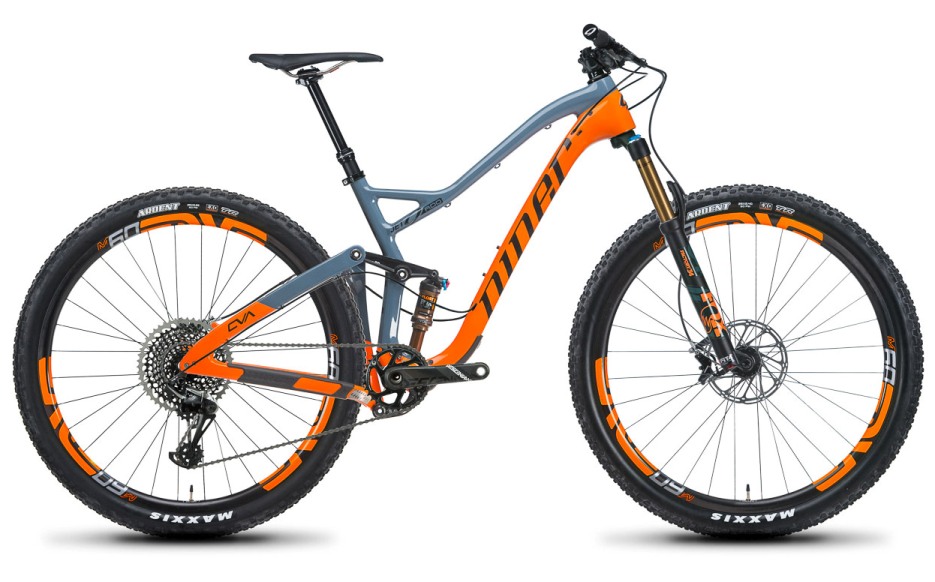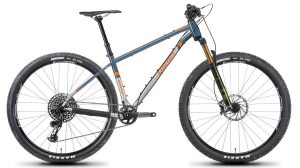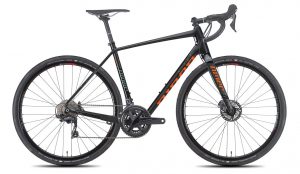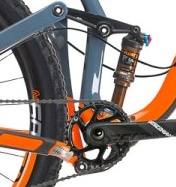 We want to let you know why we carry Niner Bikes, true mountain bike pioneers who know more about 29″ wheel dynamics than just about anyone.
We want to let you know why we carry Niner Bikes, true mountain bike pioneers who know more about 29″ wheel dynamics than just about anyone.
When selecting mountain bike brands, a few things really distinguish one company from another for us. While we carry a few big bike brands (including Trek and Specialized) who do a really good job building a wide array of bikes, small brands that demonstrate focus and specialization in what they offer have always tended to revolutionize bike categories. While Niner didn’t invent 29″ wheels on mountain bikes, they pretty much popularized it, so Niner didn’t just revolutionize a category, they arguably invented it.
Years ago, Niner founder Chris Sugai declared that one day performance mountain bikes would all have 29″ wheels. While that has not happened yet (we have our doubts that anyone is going to come up with a 29″ wheel MTB that fits someone 5’3″ very well), every year it does feel like that day creeps a little closer as 29″ wheel and design technology is refined. Niner hasn’t backed off when it comes to innovation. Today, Niner continues to be headquartered in Colorado Springs, Colorado and they produce a full range of full suspension and hardtail mountain bikes as well as gravel road bikes and a CX bike.
Niner’s Straight Forward Line of Bikes
 We like how straight-forward the Niner Bikes line is. Basically, you can either buy a Niner bike model as a frame and build it up to your liking or you can buy a complete bike with one of five levels of component/build packages. The packages are pretty straight-forward in terms of specifications (if it is a SRAM GX bike, that means that any part that can be GX, is likely GX…) and cover a wide array of price points. We like brands that don’t play around with spec games and use quality parts across their bike builds that are commensurate with each other.
We like how straight-forward the Niner Bikes line is. Basically, you can either buy a Niner bike model as a frame and build it up to your liking or you can buy a complete bike with one of five levels of component/build packages. The packages are pretty straight-forward in terms of specifications (if it is a SRAM GX bike, that means that any part that can be GX, is likely GX…) and cover a wide array of price points. We like brands that don’t play around with spec games and use quality parts across their bike builds that are commensurate with each other.
Niner Bikes also makes their frame options straight-forward. You can either buy an aluminum bike, a steel bike or you can get a carbon frame. Once you are into a carbon frame, the level of carbon is the same across price points. This means that if you get the “entry level” carbon bike, you can put any upgraded part on it in the future with the confidence that the frame is worthy.
Niner Hardtails, Gravel/Adventure and CX Bikes
As mentioned, Niner pretty much invented the 29″ wheel, that continues to become more popular each year. The frame geometry on the AIR 9 (aluminum) and SIR 9 (chromoly) is proven and  refined. With prices starting at $1700, you are hard pressed to find a more dialed in hardtail 29″ geometry.
refined. With prices starting at $1700, you are hard pressed to find a more dialed in hardtail 29″ geometry.
While Niner is relatively new to the drop bar world, they have quickly gained a good reputation. For example, the RLT (starting at $2K) gravel bike has received a lot of applause from reviewers for its forward thinking and fun/stable design. While the BSB CX bike has shown that companies capable of building great race capable mountain bikes can also build very race capable cross bikes.
Niner Full Suspension Bikes
The focal point of most mountain bike lines today is full suspension. Niner has a unique design; thankfully a design (when properly set-up) that is one of the best at doing what all suspension designers try to achieve – isolate pedal forces from active absorption. The basics of CVA suspension are as follows:
CVA = Constant Varying Arc Suspension
 Optimized around 29″ wheels. When you invent the category, you tend to focus on what works best for that category. CVA was designed to mesh with the wheel size that is Niner’s namesake.
Optimized around 29″ wheels. When you invent the category, you tend to focus on what works best for that category. CVA was designed to mesh with the wheel size that is Niner’s namesake.
Independent drivetrain and suspension forces = great climbing and descending performance. CVA accomplishes this by using the position of the lower pivot in relationship to the upper and lower suspension linkage to isolate pedal forces from suspension compression forces – regardless of chainring size. This means that your power goes to the rear wheel when you are pedaling (efficiency), yet the system remains active to absorb impact forces (plushness).
No gearing limitations. Many MTB suspension systems (especially VPP linkages) are designed to work best around specific gearing combinations; if you change the front chainring, you change the suspension. CVA suspension performance is not affected by gearing.
Minimal chain growth through the suspension arc. As the rear axle path moves through its range under compression, it moves towards the center of the bike at a gradual and Constant(ly) Varying Arc. This reduces suspension feedback in the drivetrain while also reducing drivetrain feedback to the suspension, allowing each system to work as independently of the other as possible.
What is the result? This quote from a BikeMag.com review sums up CVA,
“The new Rip 9 RDO frame still utilizes Niner’s dual-link, CVA suspension, and it may be the best pedaling all-mountain 29er I’ve ridden. It certainly feels like more of an all-day adventure machine than comparable bikes… It hides its travel on the climbs. In its ‘open 2’ setting, the Fox Float X shock’s mid-stroke support does a great job maintaining traction and not zapping momentum. I did try the rear shock’s climb settings for reference, however I never felt they were necessary.
As impressive as the Rip 9 is under pedal force, it was equally as capable on tight and twisty singletrack. And its generous rear travel and even more generous front travel made easy work of jagged, technical, terrain. The open 2 setting also allowed the bike to absorb harsh impacts at speed while not blowing through the travel.”
In other words, while there are a lot of good suspension systems and bikes on the market, CVA is as close to the holy grail of suspension performance as you can get.
Niner Bikes Fit and Sizing
Niner’s drop handlebar models use a geometry that is a little lower and longer than some of the most versatile bikes in the category (the Parlee Chebacco gravel/CX bike, for example). This means that the Niner drop bar bikes, like most bikes, will fit some better than others. Of course, the way to make sure you get a bike that fits you well is to start with a rider first bike fitting that puts your needs first and then finds the bike models that fit your position. This gets rid of the guesswork.
Niner’s mountain bikes have one big limitation that all 29″ wheel mountain bikes have – 29″ wheels are big. While some say that this doesn’t matter and you can put someone 5’1″ on a 29″ bike no problem, we have found that when a mountain bike wheel is on the big side for the rider, it can be a limitation. This being said, Niner makes some models that the reach is short and would work fine for many smaller riders, if they are okay with the stack (handlebar height) being tall.
The bottom line is that smaller riders should think about wheel size and what makes sense for them. We’re happy to talk to you about your situation, riding position and use to help you figure out whether a Niner makes sense or a different brand. Contact us.
Conclusion
No one knows 29″ mountain bikes more intimately than Niner. Whether you are looking at an enduro bike, a trail bike or a lightweight XC full suspension bike, properly dialed in, you would be hard pressed to find a full suspension 29″ line that climbs as well as a Niner and also descends as smoothly. Niner’s foray into drop bar bikes has also proven successful with bikes that are highly versatile, stable and lively. Niner bikes are well worth a close look.
View Additional Articles & Posts Related to Niner Bikes
